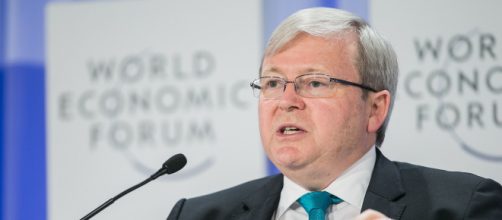Kevin Rudd is one of Australia's most prominent former politicians. Twice he was chosen as the leader of the Australian Labor Party. When he became the party leader for the first time, he also became the leader of the Opposition. After leading Labor to victory, he became prime minister. On his second go-round as leader, he was inserted directly into the prime ministerial role.
Quite famously a moderate, Rudd has maintained a high popularity rating among the Australian electorate. His time in the political spotlight would also largely occur during a particularly dramatic period in his country's politics.
Soap opera-esque squabbles and turmoil would envelop both Labor and its main rival, the (actually conservative) Liberal Party. Since leaving the public sector, Rudd has taken on a number of other roles. Including a couple of academic postings in the United States. He's now getting ready to return to the public sector, but still with a focus on the U.S.
Prime Minister Anthony Albanese names Rudd as the next Australian ambassador to the U.S.
Kevin Rudd is slated to become Australia's top official in the United States, indicates the Associated Press. His tenure is scheduled to begin in 2023. Which is when current Ambassador Arthur Sinodinos, appointed by former Prime Minister Scott Morrison, is set to step down.
Rudd is quite familiar with diplomacy. As noted by Reuters, he was once the foreign affairs minister for Australia. He served in the role under Prime Minister Julia Gillard, in between his own tours of duty in that job. Before going into elected politics, he served in a variety of diplomatic roles during the 1980s. Including postings in Sweden and China.
Rudd would become the first former prime minister to take on the Australian ambassadorship to the United States. Though several other prominent politicians have taken the post. Including former Opposition Leaders Andrew Peacock and Kim Beazley and former Federal Treasurer Joe Hockey. Outgoing Ambassador Sinodinos himself is a former Cabinet member.
Was initially heavily involved in Queensland state politics
In the late 1980s, Kevin Rudd was named chief of staff for Wayne Goss. At the time, Goss was the leader of the Opposition of the Legislative Assembly of Queensland. Shortly after, Goss became premier of Queensland and Rudd remained on as his chief of staff. In 1992, named him the director-general of the Office of Cabinet.
Rudd first ran for office in federal politics in 1996. That year, running for a seat in the House of Representatives of the Australian Parliament. The electoral division that Rudd was contesting was Griffith, located in the Brisbane region. He would lost to the Liberal nominee, Grame McDougall, on that occasion.
However, two years later, contesting the same seat, Rudd emerged victorious.
He took over the Labor Party leadership in 2006. The following year, he led his party to a federal election triumph and became prime minister.
Rudd has been given high marks for his economic and environmental policies during his first term. But infighting would take over the Labor Party. Eventually boiling down to factions that supported either him or Julia Gillard, who had been his deputy. In 2010, Gillard supplanted Rudd as Labor leader and prime minister. Shortly thereafter, Labor managed to keep power following a federal election - barely.
A few weeks later, perhaps hoping to mend old wounds, Gillard named Rudd as her foreign minister. But by 2012, tensions had reached a breaking point once again.
Rudd resigned as foreign minister and another formal leadership election was held. For a second time, Rudd fell short. But Gillard would become increasingly unpopular in the country. And yet another leadership election was held in 2013. This time, Rudd was selected and he became both prime minister and Labor leader once more.
But his second time around in each role was decidedly short. Less than three months later, it was time for another federal election. Although Rudd was personally popular among voters, the party drama had turned many of them off. Very many of them, it would seem. Labor was trounced by the Liberal-National Coalition in the election and Tony Abbott would become the new prime minister.
Rudd won re-election to the Parliament from Griffith, but he would resign his seat before the year was out. Gillard had resigned her seat before the federal election after losing the leadership race. And the Liberal Party was soon to undergo is own soap opera-worthy internal squabbles.
Has faced a number of health issues
Kevin Rudd was born in Nambour, Queensland. He was raised in nearby Eumundi on a dairy farm. When Rudd was a child, he contracted rheumatic fever. So bad was the case that it caused permanent damage to his heart. Requiring multiple surgeries in the years since.
Rudd would also have significant issues with his gallbladder. During the 2010 federal election campaign, he began suffering abdominal pain intensely enough to seek medical attention.
As it would turn out, he would need to have his gallbladder surgically removed.
A few years after the battle with rheumatic fever, Rudd's father, Albert, died in a car crash. No longer able to afford the farm, Rudd's family had to leave their home. For a time, he was boarded out of charity in Brisbane at Marist College Ashgrove. His mother, by then working as a nurse, was eventually able to take him back in. Rudd would graduate from Nambour State High School as the dux of his class. Afterward, he graduated with first class honors from the Australian National University.
After leaving politics, he took academic positions at Harvard University and the University of Chicago. Rudd also received a PhD from the University of Oxford.


